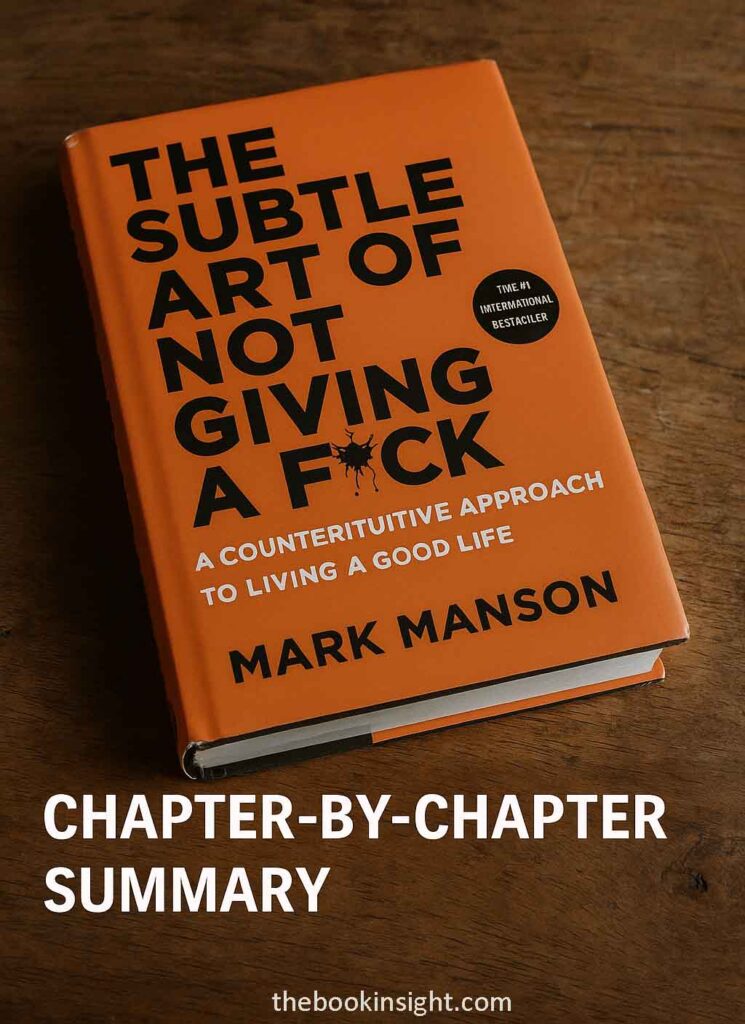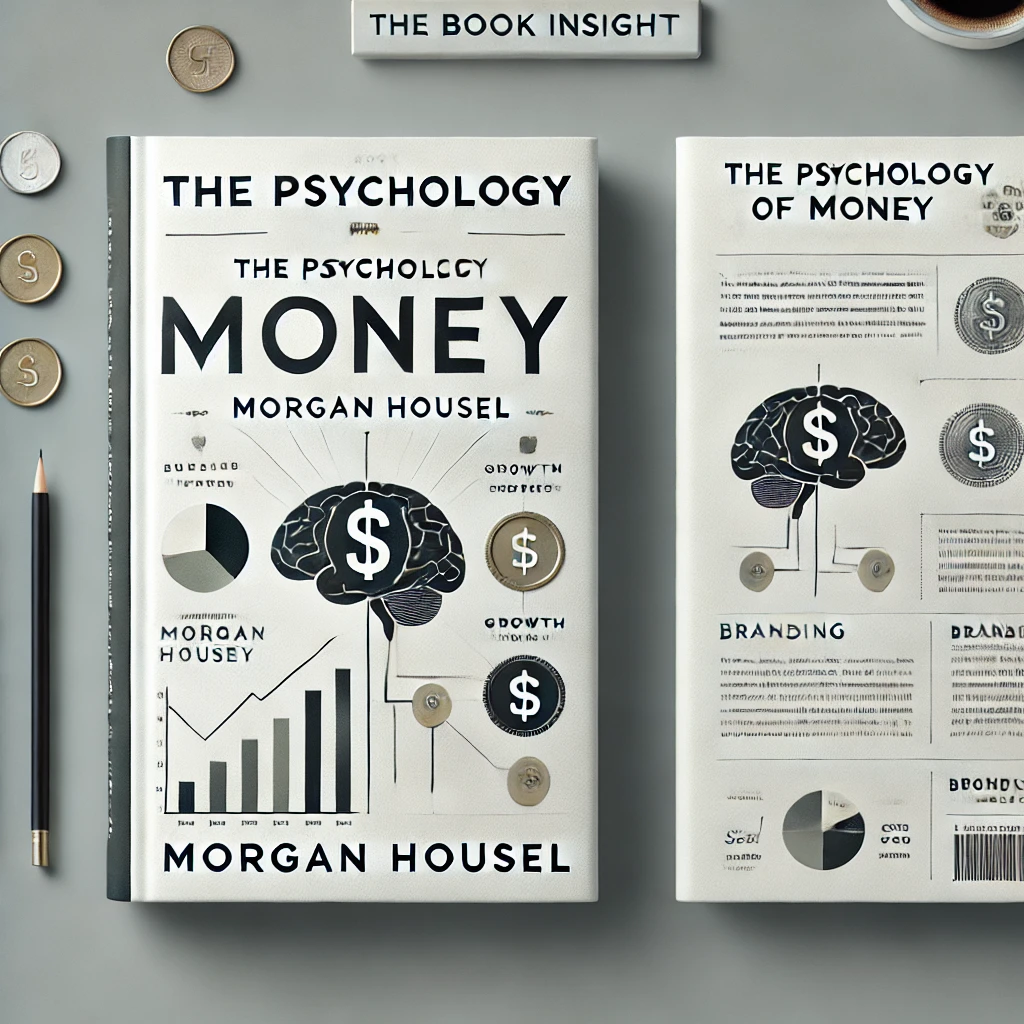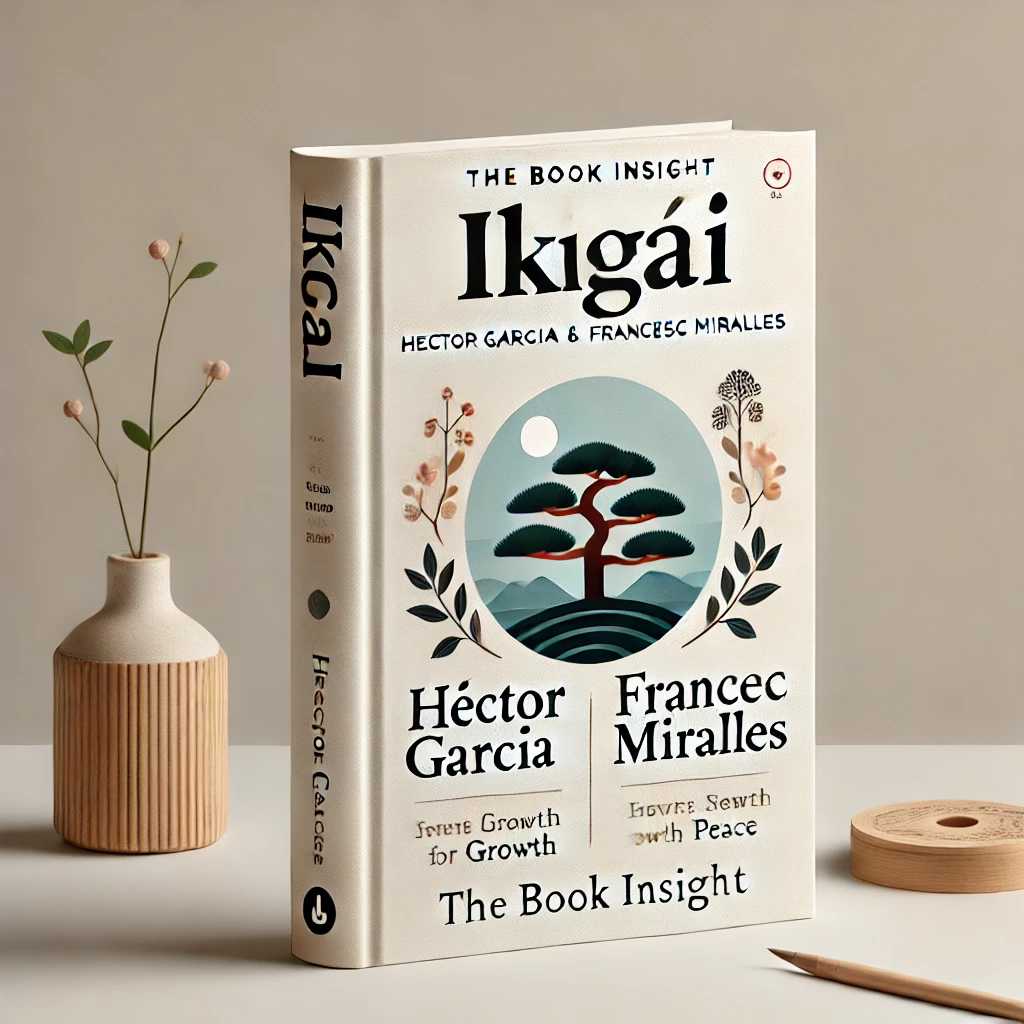Book Title: The Subtle of Not Giving F*ck
Author Name: Mark Manson
Table of Contents
ToggleIntroduction to the Summary of The Subtle Art of Not Giving a F*ck
Mark Manson’s bestseller challenges conventional self-help advice with brutal honesty and refreshing wisdom. This summary explores key chapter-wise lessons about embracing struggles, setting boundaries, and finding real happiness by caring less about the unimportant. Get ready to rethink what truly matters in life — one chapter at a time.
Chapter 1: Stop Chasing the Extraordinary — Embrace the Ordinary with Pride
The Illusion of Perfection
In today’s hyper-connected world, we are constantly bombarded with messages that we’re not enough. Social media shows us the perfect lives of others — six-pack abs, luxurious vacations, fast cars, money, and flawless beauty. This endless stream of perfection makes us feel like we’re missing out, like we’re behind in some invisible race.
Instead of accepting ourselves for who we truly are, we start chasing a version of ourselves we think we should be. We try to become extraordinary, not because we truly want to, but because we’re afraid of being ordinary — of being “just another person.”
Example: You scroll through Instagram and see someone your age buying a house, traveling to Europe, or launching a business. You immediately question your own life: “What am I doing?” That self-doubt builds pressure, even if your current life is fine.
The Problem with Always Trying to Be Better
Mark Manson argues that the constant urge for self-improvement can backfire. The moment we try to “fix” ourselves, we indirectly tell ourselves that we’re not good enough. This mindset turns self-improvement into self-rejection.
Trying too hard to be extraordinary only highlights the fact that we think we’re not.
Key Takeaways
- Constantly trying to be extraordinary can lead to self-rejection. Embrace who you are — flaws and all.
- Social media creates unrealistic expectations that make us feel inadequate. Most of it is curated, not real.
- Learn to care about only what truly matters — your energy and attention are limited resources.
- We often stress over petty things because we lack meaningful goals. Shift your focus to something bigger.
- Maturity means recognizing what deserves your emotional energy and letting go of the rest.
- Peace comes not from having everything, but from not needing to give a f**k about everything.
Chapter 2: Happiness Isn’t Easy — It’s Earned Through Problems
Pain Is a Necessary Part of Life
We often fantasize about a life free from pain — a smooth, happy existence with no struggles or setbacks. But that’s just an illusion. Pain, discomfort, and sadness are not exceptions to life; they are fundamental parts of it.
No matter how perfect someone’s life looks from the outside, every person experiences emotional and physical challenges. These struggles are what shape us and make us stronger.
Example: When you go to the gym, your muscles hurt — but that pain is what leads to growth. Life works the same way. Emotional pain often leads to wisdom, clarity, and resilience.
Instead of asking “Why is this happening to me?” in tough times, we need to say, “This is part of the process. What can I learn from it?”
Happiness Is Solving the Right Problems
Mark Manson makes a bold claim: Happiness comes from solving problems. It’s not a final destination or a state we permanently live in. It’s a byproduct of progress — the feeling we get when we overcome challenges that truly matter.
But many people fall into one of two traps:
- They deny their problems, pretending everything is fine when it’s not.
- They feel helpless, believing their problems can’t be solved and blaming others or circumstances.
Both approaches lead to frustration. Real happiness comes when we face our problems honestly and take responsibility for solving them.
Example: Someone stuck in a job they hate may either pretend it’s okay (denial), or blame their boss, family, or economy (helplessness). But real change — and happiness — begins when they say, “This is my responsibility. What can I do to fix it?”
Related Reading: To understand what truly drives lasting joy, explore The Science of Happiness — a deep dive into how our mindset and habits influence real fulfillment.
Key Takeaways
- Pain and suffering are unavoidable — they are essential for growth and transformation.
- Happiness is not a destination; it comes from solving meaningful problems.
- Denying or avoiding your problems leads to frustration. Own them to move forward.
- Don’t let your feelings dictate your decisions — long-term values matter more than short-term pleasure.
- Instead of dreaming about the results, ask yourself: Do I love the process enough to struggle for it?
- True fulfillment comes from choosing the right problems and embracing the journey.
Chapter 3: You’re Not Exceptional — And That’s Okay
The Myth of Being “Special”
Many of us grow up believing we’re destined for greatness — that we’re somehow unique, different, or more important than others. This belief is fueled by self-help culture, social media, and endless motivational quotes that promise “you are meant for extraordinary things.”
But here’s the hard truth: you are not inherently special. Life doesn’t owe you anything just because you believe you deserve it. Thinking you’re special can blind you to your flaws, make you resistant to feedback, and create unrealistic expectations.
Example: A student who thinks they’re “too smart” might never study, believing success will come easily. But when they fail, they blame the system instead of reflecting on their lack of effort.
The Trap of the “Extraordinary Life”
In today’s world, ordinary is often seen as boring or a failure. Social media constantly pushes the idea that everyone should be exceptional — earning millions, traveling the world, or launching the next big startup. This pressure creates a false sense of urgency: If I’m not amazing, I’m nothing.
This obsession with being different creates anxiety and disappointment. Why? Because the truth is, most of life is ordinary — and that’s not a bad thing.
You don’t have to be a millionaire or go viral to live a meaningful life. There is beauty in normalcy: having a loving family, doing good work, helping others, or simply enjoying a peaceful morning walk.
Instead of chasing greatness, try mastering the art of appreciating the present — that’s where real joy begins.
Key Takeaways
- You’re not special — and that’s a powerful realization. It frees you from unrealistic expectations.
- Believing you’re inherently exceptional can create entitlement and blind you to personal growth.
- The pressure to be “extraordinary” often leads to anxiety and self-doubt.
- Most of life is made up of ordinary moments — and learning to enjoy them is where real meaning begins.
- True self-worth comes from accepting your limitations and focusing on what matters to you, not the world.
Chapter 4: The Price of Pain — Why Suffering Without Purpose is Dangerous
Why Am I Enduring This Pain?
When we go through pain, loss, or emotional turmoil, our first instinct is to escape it. We ask, “How do I stop this?” But Mark Manson challenges us to ask a better question:
“Why am I enduring this pain?”
Pain without purpose is dangerous. When we suffer without a clear reason, our life can feel meaningless — like we’re stuck in a loop of hardship with no end. But when we suffer for a reason we believe in, that pain becomes bearable. It becomes a part of growth.
This is similar to Simon Sinek’s concept in Start With Why — knowing your “why” brings meaning to your actions. Many people suffer blindly, without questioning the ideals or beliefs that drive them. That’s not noble. It’s just self-destruction.
(Related: Start With Why to explore the power of purpose.)
Self-Awareness: Peeling the Layers
Manson compares self-awareness to an onion — you must peel it layer by layer. Each layer reveals a deeper level of understanding about your emotions, decisions, and motivations.
Ask yourself:
- Why do I feel this way?
- What are my personal standards?
- What do I really care about?
We often avoid these questions because the answers can be uncomfortable. But avoiding self-truth is like running from your own shadow — it never ends well. Only by facing your inner self can you understand the real reason behind your suffering — and gain control over it.
Embrace Better Ideals
Not all ideals are harmful. Some guide us toward becoming better humans:
- Honesty: Facing the truth, even when it hurts.
- Humanity: Caring about others, even strangers.
- Self-respect: Setting standards for how you treat yourself.
- Standing for Others: Defending what’s right, even when it’s hard.
These values anchor us during tough times and give our suffering meaning. They help us grow — not run in circles.
Key Takeaways
- Pain is a part of life, but it must have a purpose. Suffering without reason leads to self-destruction.
- Self-awareness is essential — we must peel back our emotional layers to find real answers.
- Dangerous ideals like toxic positivity, materialism, and ego often cause more harm than good.
- Happiness is not a permanent goal — it’s a byproduct of meaningful living.
- Adopt values like honesty, self-respect, and compassion to build a life worth enduring pain for.
Chapter 5: The Power of Choosing Responsibility
Every Choice Is a Response
Life constantly throws situations at us that we can’t control — loss, heartbreak, unfair treatment, or even random accidents. But no matter what happens to us, we always have a choice in how we respond.
Mark Manson explains that not choosing is also a choice. For instance, if a girl is torn between marrying the person she loves or going with her family’s arranged choice — and she chooses to make no decision at all — she’s actually choosing the path of least resistance, which may default to her parents’ decision. Inaction is also action. Silence is also a response.
We’re not always aware of it, but we are constantly making choices that shape our lives. These choices reflect our values, beliefs, and the criteria we set for ourselves — consciously or unconsciously.
Responsibility: A Path to Power
One of the biggest takeaways from this chapter is this: we don’t get to control everything that happens, but we do get to choose what we take responsibility for.
Mark draws a sharp line between fault and responsibility:
- Fault is what happens to you.
- Responsibility is how you deal with it.
Sometimes bad things happen that aren’t your fault — losing a job, getting betrayed, facing rejection. But blaming others or external circumstances won’t solve anything. Growth begins when you take ownership of how you respond, even to things you didn’t cause.
Example: Imagine someone is driving recklessly and hits your parked car. It’s clearly not your fault. But whether you explode in rage, stay calm and file an insurance claim, or let it ruin your week — that response is your responsibility.
Personal Reflection: Embracing the Pain
I’ve personally gone through this during a difficult heartbreak. At first, I was shattered. But eventually, I made a conscious choice: I told myself to accept the pain, stop blaming, and use that energy to grow. I started reading books, taking notes, and building this website — not because the pain went away, but because I chose to take responsibility for how I would move forward.
I found strength in a verse from the Bhagavad Gita about detachment — that nothing in this world is truly permanent. Holding on to anger, regret, or blame only makes the pain worse.
Key Takeaways:
- Not choosing is still a choice. Every action or inaction reflects a decision.
- Responsibility is not about blame, it’s about power. Taking responsibility gives you control over your life.
- Our reactions define us more than our circumstances do.
- Blame traps you; responsibility frees you.
- Pain becomes productive when you respond consciously.
Chapter 6: The Joy of Being Wrong
Growth Begins When We Accept We’ve Been Wrong
At any given point in life, we often look back at our past decisions and wonder, “Why did I do that?” or “Why didn’t I start earlier?” This reflection is a sign of growth. What once seemed like the right decision may now feel wrong in hindsight — not because it was truly wrong, but because we’ve grown since then.
Mark Manson emphasizes that this is the very process of personal development: we improve when we realize that we’ve been wrong. If you’re not questioning your past, you’re probably not evolving. Being wrong is a feature of learning, not a flaw.
Example:
Think about fashion choices or beliefs you had 5 years ago. You might cringe now — but back then, they felt right. That gap is called growth.
Certainty Closes the Door to Growth
People who believe they’re always right — or feel the need to be — block themselves from learning. The more certain you are about something, the less likely you are to explore new information or perspectives. And ironically, the people who say “I know everything” are often the ones who stop growing.
Being wrong is not just okay — it’s essential. Manson argues that progress only happens when we’re willing to admit we don’t have all the answers.
How to Be Less Certain (And Grow Faster)
Mark suggests a kind of mental humility test. Ask yourself:
- What if I’m wrong❓
- If I’m wrong, what would that mean for me❓
- If I’m wrong, is it really a huge deal — or can I learn from it and move on❓
These questions help break your attachment to being “right” and open you up to better ideas, better decisions, and a better version of yourself.
Key Takeaways:
- Being wrong is part of the growth process. You evolve by recognizing your past mistakes.
- Certainty is the enemy of progress. The more you think you know, the less you grow.
- Don’t put yourself on a pedestal. Real self-awareness comes from embracing your ordinariness.
- Question your beliefs regularly. It keeps you humble, open, and always learning.
- Progress requires mental flexibility. Ask yourself: What if I’m wrong?
Chapter 7: Embrace the Pain, Follow the Process
Failure Is a Stepping Stone, Not a Setback
Failure is not the opposite of success — it’s the foundation of it. From our earliest experiences, failure teaches us how to move forward. Think about a child learning to walk. They fall down countless times, but each fall is a lesson. Eventually, they succeed — not in spite of falling, but because of it.
We forget this as adults. We see failure as something shameful or painful, rather than recognizing that it’s just part of the learning cycle. Whether it’s learning to ride a bike, drive a car, or take emotional risks — mistakes help shape who we become.
Example:
The first time you tried to ride a bicycle, you probably fell and got hurt. But did you stop trying? No — because every fall taught you how to balance better next time. The same applies to relationships, careers, and even self-improvement.
Pain Is the Process That Shapes Us
Pain feels like destruction, but in reality, it’s transformation. Just like raw gold is refined through intense heat, we are shaped by our struggles. Manson reminds us that pain is not the enemy — avoiding pain is.
Emotional pain from heartbreak, failure, or loss teaches us about ourselves. It builds maturity, resilience, and depth. You mentioned a personal example — losing someone you loved. That pain, while deeply human and hard to process, also helped you grow emotionally. It pushed you toward self-discovery and building something meaningful — like this website.
Quote connection: The idea reflects the Bhagavad Gita’s teaching — that detachment from outcomes and acceptance of impermanence leads to strength and peace.
Key Takeaways:
- Failure is essential for growth. Every mistake is a lesson that shapes you into someone stronger.
- Pain is not punishment — it’s refinement. Like fire molds gold, pain molds character.
- Waiting for motivation is a trap. Start with action — it’s the first step to clarity and confidence.
- Stop overthinking, start doing. Movement creates momentum.
- Accept pain as part of life. Resisting it only creates suffering. Embracing it leads to transformation.
Chapter 8: The Power of Saying “No” — Redefining Freedom Through Boundaries
Uncomfortable Truths Are Powerful
We often feel irritated or hurt when someone gives us raw, unfiltered honesty. But that discomfort is a signal — not of disrespect, but of truth challenging our perspective. We live in a culture where sugarcoating and social niceties are common, so direct honesty feels like an attack.
But truth — even when it hurts — is what helps us grow. Mark Manson shares a story of traveling to over 55 countries and learning this lesson in Russia, where people are culturally more direct. Unlike Western societies where politeness is often prioritized, Russians speak blunt truths. It’s not rude — it’s real.
Think of the frog in the well who believes the well is the whole world. Until it sees the ocean, it never realizes how small its world was. Honest feedback is that ocean.
Rejection Leads to Clarity and Growth
Rejection — or the act of saying “no” — is not about being rude or distant. It’s about respecting your own values and emotional bandwidth.
Many of us say “yes” to please others — to avoid discomfort, conflict, or guilt. But this often leads to living a life driven by others’ expectations, not our own desires. Manson explains that rejection is a form of honesty, and being rejected (or rejecting others) brings clarity about what truly matters.
Example:
Imagine always saying yes to a friend who drains your energy or disrespects your boundaries. You begin to resent them, lose time for yourself, and feel emotionally trapped. One honest “no” could restore your peace, set healthy boundaries, and rebuild mutual respect.
Commitment Creates Freedom
It may sound contradictory, but true freedom comes from commitment. When you commit to something meaningful — a relationship, a value, a purpose — it gives direction to your life. You stop chasing distractions and start building something with depth.
Mark Manson explains that the fear of missing out (FOMO) often keeps people from committing. But real happiness doesn’t come from having every option — it comes from choosing a few things that matter deeply and investing in them fully.
Example:
Committing to one partner allows you to build trust, emotional security, and long-term happiness. Similarly, committing to your goals helps you avoid the anxiety of indecision and stay focused on growth.
Key Takeaways:
- Honest feedback may hurt, but it heals. Accepting hard truths opens the door to self-awareness.
- Saying “no” is self-respect, not selfishness. Boundaries protect your energy, priorities, and peace.
- Great relationships thrive on mutual responsibility. Avoid emotional dumping and blame.
- Commitment provides clarity and focus. The more you commit, the more freedom you gain from distractions.
- Travel and experience broaden your worldview. Learning from other cultures helps us break free from limited thinking.
Chapter 9: Embracing Mortality — Why Death Gives Life Meaning
The Forgotten Truth of Life: We Will Die
In our busy, achievement-driven lives, we tend to forget the one truth that unites all of us — we are going to die. No matter how rich, famous, talented, or powerful we become, death is the only certainty. And yet, we avoid thinking about it.
Society teaches us to chase significance — to be “remembered,” to leave a legacy, to “make it big.” But as Mark Manson argues, this obsession with legacy is rooted in fear, not fulfillment. We want to be remembered because we fear being forgotten.
But what if we accepted death instead of fearing it? What if we stopped trying to be “great” in the eyes of others and simply lived a meaningful life on our own terms?
Real Freedom Comes from Letting Go
Many people are trapped in trying to “be somebody” — to prove themselves to the world. But the irony is that real greatness comes from letting go of that pressure.
You don’t need to do something extraordinary to matter. Your life has value simply because you’re alive. The people you love, the small kindnesses you show, and the way you live each day — these are the real markers of a meaningful life.
Example:
A nurse named Bronnie Ware once interviewed people on their deathbeds. One of the most common regrets was: “I wish I’d had the courage to live a life true to myself, not the life others expected of me.” Manson’s message echoes this wisdom — death reminds us to be honest with ourselves now, while we still have time.
Key Takeaways:
- Death is the ultimate truth of life. Accepting it brings clarity and purpose.
- The race for greatness is often a distraction. You don’t need to be remembered to live meaningfully.
- Letting go of ego leads to freedom. True peace comes from living authentically, not impressing others.
- Focus on what really matters. Relationships, values, and inner growth outweigh fame or success.
- Life is short — live intentionally. Don’t wait until it’s too late to choose your own path.
Conclusion: The Unfiltered Truth About Living a Better Life
Mark Manson’s The Subtle Art of Not Giving a F*ck delivers a refreshing, brutally honest guide to living a more meaningful life — not by avoiding pain, discomfort, or failure, but by embracing them as essential parts of the human journey.
One of the most powerful messages is the idea that we don’t need to chase every problem or carry the weight of everything. We can choose what to care about, and in doing so, reclaim our time, energy, and emotional peace.
His concept of “saying no” is not about being cold — it’s about setting boundaries and being honest, even when it’s uncomfortable. And when we realize that we will make mistakes, we will fail, and we will face loss — we gain the wisdom to live more authentically, without guilt or pretense.
This book reminds us that life doesn’t have to be perfect to be meaningful. It just needs to be honest.
What’s Next?
If this summary sparked a shift in your thinking, imagine what reading the full book can do. But don’t stop here — keep growing, keep questioning, and keep choosing what truly matters.
👉 Liked this chapter-wise breakdown? Share it with someone who needs a little clarity and courage today.
🔔 Stay updated with more insightful book summaries and self-growth content — Subscribe to The Book Insight Newsletter!



